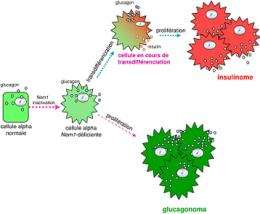Cancer and diabetes: One discovery is affecting two areas of research

Killing two birds with one stone. Sometimes, research results open up unexpected possibilities. This was what happened in the experiments of Chang Xian Zhang, a senior research scientist at Inserm, and his collaborators in the Laboratoire Géeetique Moleculaire, Signalisation et Cancer (CNRS, France). Their recent work on pancreatic endocrine tumours is also proving beneficial to research on the development of diabetes treatments. The results were published today in the May 2010 issue of the journal Gastroenterology.
While studying the origins of certain pancreatic endocrine tumours, the scientists have observed the phenomenon of transdifferentiation of pancreatic alpha cells into insulin secreting cells. As well as shedding light on the mystery of the formation of these tumours, the results provide very useful information for the development of treatments for diabetes. Type 1 diabetes is characterised by loss of beta cells which produce insulin. Finding a way to restore those cells and their function is one of the main objectives of research into that disease.
For over 10 years, Chang Xian Zhang and his collaborators have been one of the world's most active teams in the search to understand the functions of the Nem1 gene. Inactivation of this gene results in the appearance of several types of endocrine tumour (the syndrome is known as "Multiple Endocrine Neoplasia Type 1"), including pancreatic endocrine tumours. These are known for their complexity. A little less than one third of these tumours consist of cells which, unlike normal cells, secrete several hormones, giving rise to several hypotheses on their cellular origin. Uncovering the processes involved in the appearance and development of these tumours is therefore key to understanding them better, improving their diagnosis and refining their prognosis, as well as for monitoring or even treatment of pancreatic cancers.
How does inactivation of the Nem1 gene give rise to the birth of such tumours?
Using murine models, the team inactivated this gene in the pancreatic alpha cells which secrete glucagon. In a very surprising way, these mice develop not only alpha cell tumours but also insulin secreting beta cell tumours, as well as mixed tumours secreting both hormones. Using various analysis techniques, members of the team have been able to show, for the first time, that inactivation of the Nem1 gene leads, initially, to proliferation of alpha cells after which these cells become insulin secreting. This involves the phenomenon of transdifferentiation leading, in this case, to the development of both alpha cell and beta cell tumours, as well as mixed tumours. The Nem1 gene therefore plays an important role in controlling the plasticity of pancreatic alpha cells.
A discovery that has benefits for two diseases
Understanding the mechanisms of transdifferentiation of pancreatic alpha cells into insulin secreting cells may provide a better explanation for the cellular origin of observed pancreatic endocrine tumours. The objective was to refine the diagnosis and prognosis for these tumours and to identify possible suitable therapeutic targets.
"As well as new approaches to research against cancer, the investigation of mechanisms responsible for transdifferentiation revealed in this article, will allow a better understanding of the biology of pancreatic endocrine cells and the design of new strategies for regeneration of pancreatic beta cells, a major challenge in the treatment of diabetes" concludes Chang Xian Zhang.
More information: α-cell-specific Men1 ablation triggers the transdifferentiation of glucagon-expressing cells and insulinoma development, Gastroenterology, May 2010; 138:1954-1965














